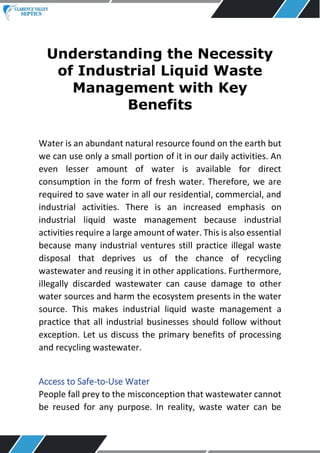The Best Strategy To Use For Reclaim Waste
The Best Strategy To Use For Reclaim Waste
Blog Article
See This Report on Reclaim Waste
Table of ContentsThe Best Strategy To Use For Reclaim WasteSome Known Questions About Reclaim Waste.Reclaim Waste Things To Know Before You BuyThe Greatest Guide To Reclaim WasteThe smart Trick of Reclaim Waste That Nobody is Talking AboutThe Best Guide To Reclaim Waste
If your company generates any kind of kind of waste, you're already accustomed to the day-to-day difficulties of handling it - liquid waste disposal. Did you recognize that there are best practices for waste management? In this post, we'll discover some of the very best means to maintain your organization's general and liquid waste under controlReview on and learn how to handle your business waste in the most efficient means possible! Recycling is just one of the ideal ways to minimize the amount of waste your company produces. By establishing a reusing program, you'll not just save money but aid maintain important materials out of landfills.
Composting can help in reducing the quantity of waste you send to the landfill, while also generating a nutrient-rich dirt modification that you can utilize in your gardens or lawns. As opposed to dealing with liquid non-hazardous waste, facilities can capitalize on the possibility to produce fertilizer. After removing the water from the waste, there will certainly be organic matter including important nutrients such as nitrogen, potassium and sodium.
This can be done with basic actions such as reducing the quantity of product packaging made use of in products or switching over to recyclable containers instead of non reusable ones. Incineration is commonly utilized as an approach of contaminated materials disposal, yet it must be utilized cautiously. The procedure involves specialized heaters that incinerate acids, chemicals, oils and various other excrement; the warmth leaves just water behind.
The Of Reclaim Waste
Furthermore, Incinerators are pricey to build, preserve and operatemaking them a bothersome service for several facilities. Along with recycling and composting, there are other strategies for decreasing the amount of waste your business generates. Practices such as and like paper, cardboard boxes, and plastic containers can greatly minimize the quantity of waste your business produces.
The remaining choice is to dispose of the liquid waste as-is, many of the moment with aid from a specialist disposal team. The facility collects its liquid squander into appropriate drums and afterwards sends it off; the waste monitoring firm carries it away for proper removal based upon nationwide and state guidelines.
Appropriate disposal is vital to reliable waste monitoring. Ensure everything you get rid of is appropriately arranged and dealt with according to local regulations. If you don't have the time or sources to handle your organization's waste, working with an expert waste administration company can be a terrific method to guarantee that it's done right.
All about Reclaim Waste
You can make sure that your company is doing its component to safeguard the setting and save sources. With our assistance, any kind of company can come to be much more lasting and decrease its ecological impact. Call us today to read more about just how we can assist you handle your business's waste in one of the most efficient and efficient way feasible.

Do you bear in mind the interpretation of sanitation used in Study Session 1? Sanitation was defined as the prevention of contact between humans and waste.
Reclaim Waste Fundamentals Explained
Hygiene approaches intend to lower the spread of condition by guaranteeing that wastewater, excreta and other wastes are adequately treated. This session will certainly help you to respond to the hygiene needs of families and organizations. When you have studied this session, you ought to have the ability to:19.1 Specify and properly use the keywords published in strong.
(https://www.cybo.com/AU-biz/reclaim-waste)(SAQ 19.1)19.3 Explain some different methods of fluid waste disposal. (SAQ 19.2) In Research Session 18 you discovered that liquid waste consists of human waste, sullage, industrial waste and overflow (likewise referred as storm water or flooding water). Sewage includes human wastes (i.e.
Sullage is the wastewater that arises from domestic activities residential as washing in bathrooms and restrooms, including water consisting of food preparation and prep work; it does not contain human excreta (liquid waste disposal melbourne).
The Definitive Guide for Reclaim Waste
Industrial waste may be toxic and hence unsafe in nature, or it can contain non-hazardous compounds. Unlike the other kinds of fluid waste, some industrial wastes may require special treatment prior to discharge from the sector. Drainage is just flooding water that go to this website arises from rain or the launch of collected water from a pond or dam.
It is possibly harmful to the health and wellness of the area. Fluid waste is also created in medical care facilities but this will certainly be dealt with carefully in Research Session 23. Management of liquid waste concentrates on finding a means to get rid of the waste in a means that is safe for people and the environment.

The technique made use of need to be simple and cost-effective in building and operation. The technique ought to last for at least 5 years to be cost-efficient. In Study Session 18 you were introduced to some of the sanitation technologies that are utilized for human waste management. You may recall that WCs and pour-flush centers were classified as wet or water carriage systems, also called drop-flush-and-discharge systems.
Report this page